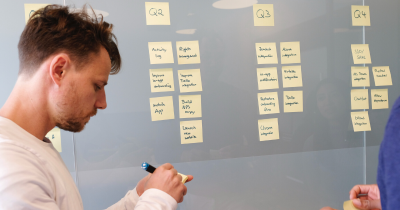How to Run a Product Discovery Workshop (With Templates and Examples)
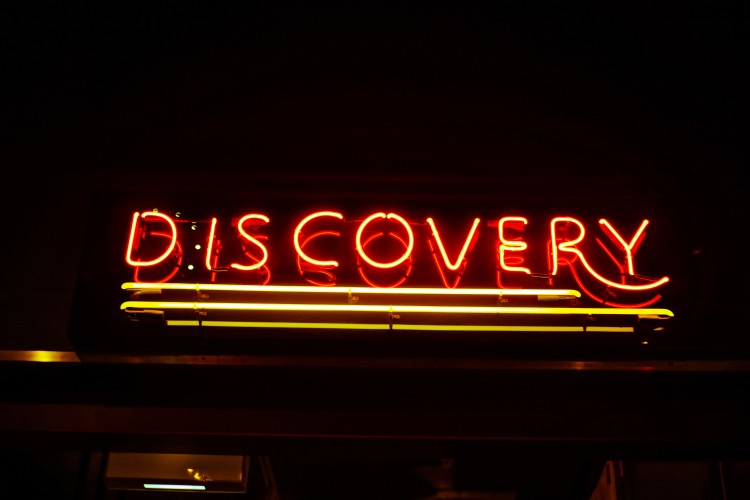
There are several ways to look at a product discovery workshop.
Some teams may view these sessions as briefing meetings, where everyone involved gets together to discuss the scope of the work and why it’s important.
Others may see these workshops as vital problem-solving exercises; now that we know what we’re building, what issues can we expect and how can we mitigate them?
Each of these definitions would be right — as would any other articulation of a product discovery workshop that seeks to explore a product’s potential and how the business will make it a success.
What are the main benefits of a product discovery workshop?
1. Helps reduce costs
First, hosting a product discovery workshop helps reduce costs in the long term. By ensuring that everyone is on the same page early on, you can prevent mistakes, time spent undoing and/or redoing work, and the number of conversations you need to have with stakeholders in your team.
In other words, establishing a strong foundation early on is crucial in preventing unexpected costs later down the line. It's a great preventative measure in this way and especially important for those working with a tight budget.
2. Improves product delivery
Another benefit of product discovery workshop exercises is that they help improve your product delivery. We’ve all worked on at least one build that seemed to go off-piste, unexpectedly, right before launch. Unforeseen issues, misunderstandings that need to be corrected, and other errors can seemingly crop up out of nowhere in every product team.
A product discovery workshop is a great way to prevent these instances from happening. Again, it's all about preparing a solid foundation so that everything goes over smoothly later on.
3. Helps you meet your users’ needs
Perhaps the most important benefit of a product discovery workshop is that it makes it far easier to meet or even exceed your end users’ needs.
Customer feedback can reveal valuable insights once your product is already live. But the product discovery workshop provides an opportunity to get everyone aligned on who the end user is and what problem you’re looking to solve for them — before anything gets built. The product team may summarize and share user personas, early testing results, and other research-backed artifacts to perfectly set the scene.
4. Speeds up production
Another important benefit of investing in a product discovery workshop is that it can speed up your production process. This is largely due to all of the benefits we've covered so far.
Reducing mistakes, removing confusion, and aligning expectations are all great ways to keep production running smoothly. And sometimes, if you're lucky, things can go better than smooth and you could end up launching early.
5. Aligns everyone on the project
Again, this benefit largely goes hand-in-hand with everything else that we've been covering. Following a product discovery workshop template is an excellent way to make sure that everyone is aligned on the project.
This is also why it's necessary that all team members and stakeholders are included in the workshop. Having everyone in one place at the same time is one of the best ways to ensure that everyone is clear on their role and what's expected from the finished product.
6. Sets the tone for the rest of the development process
As mentioned above, running a product discovery workshop also has the benefit of setting the tone for the rest of the development process. In a way it's a lot like a handshake, giving everyone a feel for where they stand, what the aims of the rest of the involved individuals are, and so on.

What happens during a product discovery workshop?
Alright, so we've covered the benefits of a product discovery workshop and the general idea of what it is. But you are probably still wondering, what actually takes place during a product discovery workshop?
Well, the answer is: a lot. During a workshop, you and your team will discuss the end users’ goals and needs, opportunities for the product, and the technologies and platforms that will be involved.
You'll also cover things like logistics, your budget, objectives and outcomes, who is going to be assigned what role, and so on.
In essence, the idea is to cover all of the basic groundwork and accept feedback as you do so.
How long does a product discovery workshop take?
The ideal duration of a product discovery workshop may depend on how many people are invited and need to feed in, how complex the product you’re discussing is, and how much time you have until launch! Generally, one day should be plenty of time to complete a workshop.
If a full day sounds too long, consider how much information you are going to be covering during the workshop. You aren't just touching base on various points, but also getting insights, advice, questions, and general feedback from everyone involved in the workshop.
Who participates in a product discovery workshop?
Speaking of those involved, let's now cover the specifics of who should be involved in a product discovery workshop agenda. The answer to this question is quite broad because you'll want to try and include everyone.
That means including all of your stakeholders (the client, your higher-ups, and other product managers) and most if not all of your team. This way, everyone is at least present to soak up the information you cover, and ideally able to ask questions or provide insights during the workshop.

A product discovery workshop template agenda
You’ll want to design your workshop agenda around your specific needs, but the below schedule contains all of the essentials in one template.
Introductions - 10 minutes
Present and discuss the Product Vision - 45 minutes
Write the product’s elevator pitch - 30 minutes
Break
Set your KPIs - 20 minutes
Write/present and explore user personas - 45 minutes
Break
Write the user story or stories - 90 minutes
Set your product priorities - 30 minutes
Break
User Story Mapping - 90 minutes
Wrap up, set next steps, and define the team - 45 minutes
Any last questions or concerns.
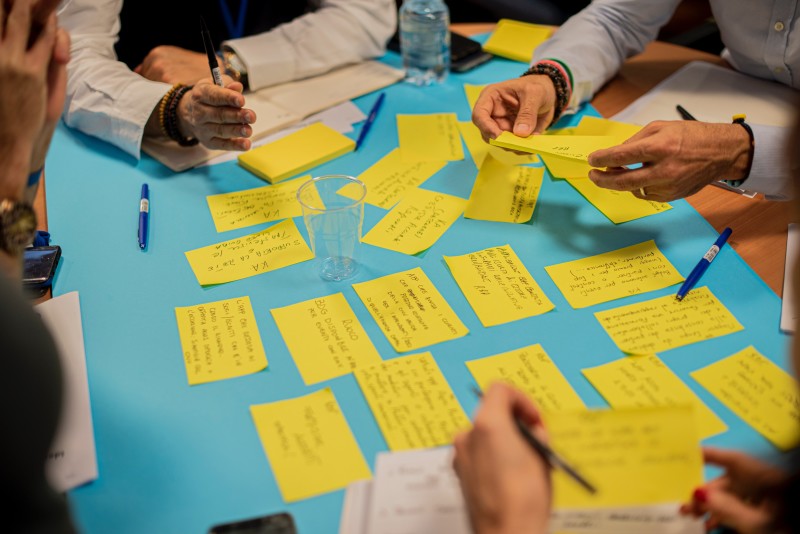
What are the deliverables from a product discovery workshop?
Align product vision and purpose
The first major outcome you can expect to gain from engaging in a product discovery workshop is that everyone should be aligned on your product vision and purpose. If this doesn't happen, then you've probably taken a misstep somewhere.
We already covered the benefits of this alignment, so just know that it's something you should expect to gain from holding a workshop.
Set clear, SMART goals
Next, you should collect some SMART goals from your product discovery workshop. For those that don't know, a SMART goal is a goal that is Specific, Measurable, Achievable, Realistic, and Timely.
In other words, they're exactly the kind of goals that you should be striving for whenever embarking on a product development cycle. It's a way to set goals that are realistic for your team and necessary to the successful completion of your build.
Define your value proposition
Another important deliverable that can come from a product discovery workshop is a definition of your value proposition. This is something that both you and your client/manager can work on collaboratively during the workshop.
However you define the value of the product you're trying to create, know that this is one of the best times to do so. Everyone will be in the same room, so there should be no misunderstanding about the "why" of your product.
Define target audience, user personas, and more
One of the best things that can come from a product discovery workshop is that it'll clue everyone in on your target audience and user personas. This is something that, too often, ends up being left to the manager and marketing team alone.
However, defining these aspects of your product can go a long way towards improving the design of your product, improving the testing phases, and otherwise providing your development team with critical ideas on how to design the product.
Start to work on user journeys
User journeys are another facet of product development that often end up being left to marketing teams, which leaves your development team sorely out of the loop.
Fortunately, you can change this by spending the extra time upfront on a product discovery workshop. During the workshop, you can come up with rudimentary user journeys that can inform various individuals on how to better perform their role in the development process.
Define success metrics
Again, this is a detail that you should have during every product development cycle. However, the information is largely kept between the stakeholders and product manager, leaving the rest of your team a bit more aimless than they need to be.
During your workshop, you can start to define your success metrics. This will help everyone involved know how to better prioritize their individual goals and work.
How do you define the goals of your product discovery workshop?
Okay, let's be realistic for a moment.
You probably aren't going to be able to cover all of these topics, benefits, and deliverables in depth during a single product discovery workshop. So how do you go about ensuring you get the most bang for your buck during a workshop?
As with anything tied to product development, you achieve this by defining the goals of your workshop. Out of all of the benefits and deliverables we've covered so far, which are most important to you? What about your current project? List these goals and make them the focus of your workshop.

Product discovery mistakes and how to avoid them
There are a few common mistakes PMs make during product discovery workshops but don’t worry — we’ve got some tips to help you avoid them!
Only focusing on the product
Customer-centricity is key to staying afloat in an ever-turbulent market. Many product teams get caught up in making the product perfect, but you can’t achieve perfection without always keeping the user in mind.
With every feature, and every decision, make sure to keep customer value in mind. There’s no point building a really cool feature if your customers don’t need it!
Being stuck to your initial vision
Things don’t always go according to plan in life or product management. Product managers will know all too well how projects can deviate from the initial vision. Unfortunately, many PMs will cling to the initial vision for dear life and refuse to adapt, even when there’s a clear need for change. Yes, you should be keeping the initial vision in mind throughout development, but don’t make it the be-all-end-all for the project.
Avoid using product discovery workshops to validate your current ideas. Use these workshops to expand your understanding of your users, their pain points, market conditions, etc. Then use that knowledge to influence decision-making, rather than just guessing.

Forgetting the “so what” test
There’s a lot of focus placed on getting to the root of a problem rather than focusing on a fix. This is great practice overall, as understanding a user’s issue can help guide progress more holistically. However, teams can get caught up investigating the problem instead of actually doing something about it.
The “So what?” test can help teams get the best out of their discovery sessions. When you ask yourself, “So what?” you’re essentially asking why a user would care about your proposal. This will help promote customer centricity and instil value into everything you do.
Delaying delivery in favor of discovery
There’s always a feeling that the product is never quite finished. You want the best possible result to blow your customers away, but this can lead to a never-ending cycle. You need to accept at a certain point that it’s time for delivery and move on.
On the other hand, you shouldn’t stop running discovery just because it’s time to deliver. Sure, your focus will be elsewhere, but stopping discovery altogether will make things difficult when it’s time to start back up. Maintaining good habits is always better than trying to reestablish them.
Tips for running a successful product discovery workshop
Keep the workshop focused
For starters, you'll want to keep the product discovery workshop focused. A great way to do this is to outline your goals ahead of time, as well as practice what you're going to say and ask early on.
Encourage participation from all of your team members
Next, you'll want to encourage participation from all of your team members and stakeholders. To avoid running into hesitant participants, you can pass around an object, indicating that it is the object holder's time to speak. This way, everyone has a chance to share their thoughts and ideas.
Take breaks for brainstorming
With only one day to successfully navigate your product discovery workshop, it can feel like you're in a rush. However, taking breaks can actually give you better results. Giving people time to brainstorm and mull things over is a key way to get quality feedback.
Be prepared to pivot
Lastly, be prepared to pivot.
A workshop is an organic process, and you may find that certain insights or questions change the course of your workshop. As long as this doesn't interfere with your goals, it's probably worth leaning into.
Product discovery workshop questions to cover
During product discovery workshop exercises, you'll encounter similar types of questions from your team and stakeholders. Some of the most common questions include:
What's the purpose of the product?
What's the problem you want to solve?
How will you differentiate yourself in the market?
Who are your users?
What's important to them?
What kind of problems do they have?
By being aware of these questions ahead of time, you can answer them during the workshop so that you save time when you're ready to take questions from your audience.

Examples of software for product discovery
There’s a wide range of software that can help with product discovery. Some are better than others, but the right one for you really depends on your needs. Let’s look at some of the popular platforms so you can decide for yourself.
Miro
Miro has made it easier to run product discovery with a large range of templates. Their “Infinite Canvas” offers unlimited whiteboard space, designed to remove the barrier to customer collaboration. This allows product teams to increase the number of inputs they can use for discovery without navigating countless screens to collect the right information.
Product teams can hold discovery workshops in person or remotely with Miro Smart Meetings. The centralized inputs and cloud-based platform means everyone can stay connected throughout the discovery stage, bringing true alignment.
Possibly the most helpful feature is that Miro allows you to consolidate your insights and product recommendations to present in Miro or export into your preferred tool. This means you’re not tied to one platform.
Figma
Figma may not be your first thought when it comes to product discovery. But, thanks to its great community and the ability to build almost anything, there are plenty of ways to use Figma to improve product discovery efforts.
Figma enables product teams to quickly mock-up and test design ideas, prototypes, and user flows, making it an ideal tool for product discovery. Figma helps with product discovery by providing an easy way to visualize ideas, allowing teams to rapidly create and iterate on design concepts.
Most importantly, Figma allows for real-time collaboration between team members, allowing for quick feedback and rapid iteration. By enabling teams to quickly create and test prototypes, Figma helps reduce the risk of investing in the wrong product idea, ensuring that teams are building the right products that meet their users’ needs.
Trello
While many product teams will choose Atlassian’s other platform, Jira, for product discovery, there’s a lot that can be performed with Trello too.
Trello can assist with product discovery by providing a visual overview of the product development process, from ideation to launch. With Trello, product teams can create boards, lists, and cards to capture ideas, user research, feedback, and other information relevant to the product discovery process.
Trello lets teams collaborate in real time, enabling cross-functional teams to share information and insights as they work toward product discovery. Trello's flexible interface also allows teams to customize their workflows, making it easy to adapt to different stages of the product development process. Trello helps teams stay organized, focused, and efficient by providing a centralized platform for tracking and managing their product discovery efforts.
airfocus
Call us biased, but we believe airfocus is one of the best product discovery software tools out there! airfocus’ unique, modular approach means product managers have everything they need all in one place. With a wide range of pre-built templates and built-in prioritization features, airfocus has all the resources you need to kick off your product discovery process. And we’re always adding new features and functionality to make product managers’ lives easier.
Speaking of new features, we�’ve got a new secret weapon at airfocus — AI Assist. AI tools can offer immense value to product managers, so we created a purpose-built AI dedicated to making your product cycles easier.
Rather than spending hours upon hours on minutia, you can simply use AI Assist to streamline your entire product discovery. With a simple slash command, AI Assist will:
Generate product ideas based on customer and market needs and trends
Generate ideas for product features based on user feedback
Draft a product positioning statement
Conduct a SWOT analysis of the product
Generate a unique value proposition and market positioning for the product
Carry out a market analysis for the category of the specific product
Identify customer pain points of the specific product
Carry out a competitor analysis for products and features
AI tools are there to help you free up more of your time, and assist you with your product tasks, but always use thinking, and ask for evidence to evaluate their responses.
Discover even more insights with airfocus
And that's it! That's everything you need to know before conducting your first product discovery workshop.
In this guide, we outlined a template agenda for your next product discovery workshop. And you know where to head for other useful templates from the airfocus team.
We’ve also got our official airfocus ebook ‘How To Use Customer Feedback for Business Growth’. This can help you prepare for both the product discovery workshop exercises and your overall product management approach. A good start also can be using airfocus' prioritization, or using AI Assist to help you plan the next step.

Tomas Prochazka
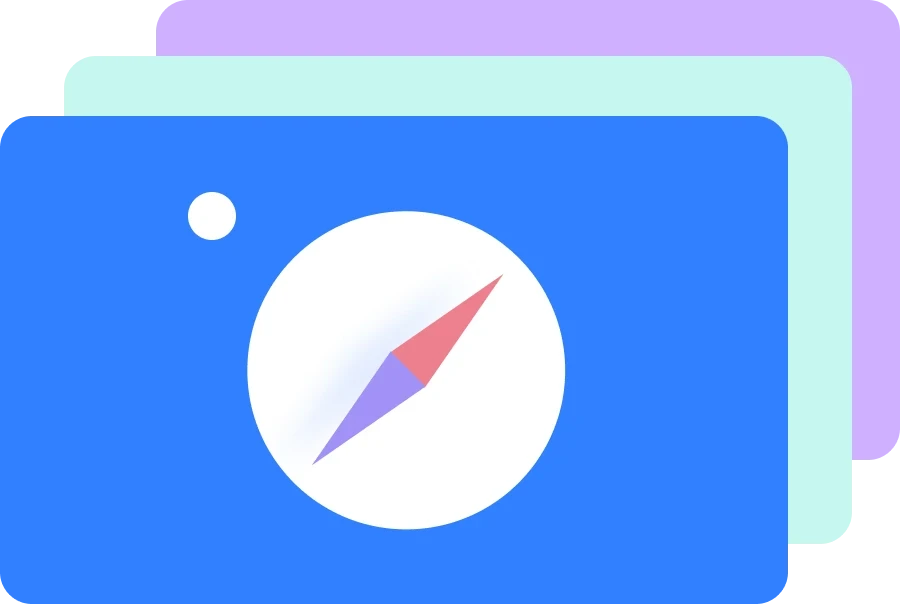
Read also

Create effective product strategy

Experience the new way of doing product management


